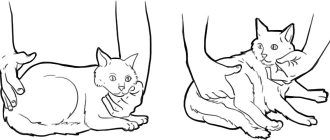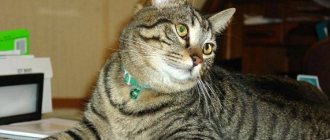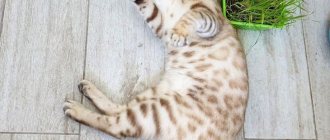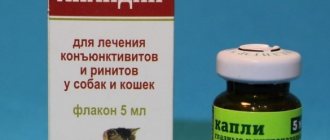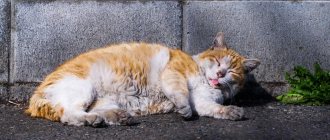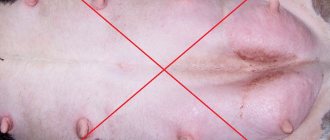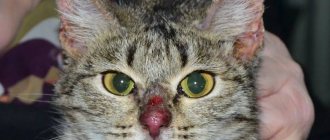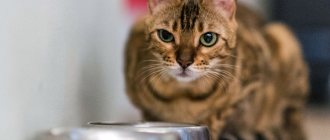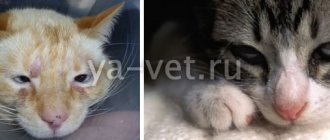Many people prefer to think about the importance of immunity only during the flu and ARVI season. But this does not mean that the rest of the time the body’s defenses are inactive. If the immune status decreases, this is fraught with permanent diseases that are difficult to treat. The same goes for our pets. Immunomodulators for cats can help in this situation.
Basic rules for taking medications
Immunomodulators are medications that have a positive effect on the immune system. They are able to spur and restore its functions. Drugs that affect immunity began to be used by veterinarians about 20 years ago. But in order for the medications to bring only benefits, you need to follow some rules:
- Before choosing a drug, pet owners should consult a veterinarian.
- You cannot take several immunomodulators for cats at the same time.
- The drugs are not prescribed to animals during the vaccination period.
If the doctor recommended several immunomodulators, then they should be taken one at a time, but not simultaneously. In case of exacerbation of chronic diseases, veterinarians recommend the following drugs: “Fosprenil”, “Transfer Factor”, “Immunofan” and others.
"Globfel"
The drug is used both for the treatment and prevention of infections. Immunomodulator for cats with viral diseases "Globfel" contains antigens obtained from the blood serum of other animals. Manufacturers recommend using the drug for the following infections:
- chlamydia;
- rhinotracheitis;
- panleukopenia;
- calicivirus.
Veterinarians often prescribe Globfel to develop passive immunity in cats. The drug containing immunoglobulins does not replace vaccination, but it is used in cases where it is impossible to vaccinate for some reason. "Globfel" is used for those animals that have been in contact with infected brethren. This is especially true for unvaccinated cats and those individuals whose vaccination was overdue.
"Gamavit"
An immunomodulator for cats in injections is used in the treatment of many diseases, including viral ones. The drug "Gamavit" is a complex product that contains sodium nucleinate and denatured placenta, as well as biologically active substances.
The drug has a beneficial effect on the metabolic processes occurring in the cat's body. It normalizes the animal’s blood, improves its ability to resist stress and increased physical activity. It has been noted that “Gamavit” increases the viability of newborn kittens and reduces the mortality of offspring.
Veterinarians prescribe this drug for any infectious diseases, infestations, and exhaustion. With Gamavit, animals recover faster after surgery and can withstand stress and travel more easily. The drug is prescribed to cats during pregnancy to produce viable offspring and prevent toxicosis.
How to boost your cat's immunity
An effective effective method that activates the launch of specific antibodies to certain types of pathogenic elements is preventive immunization (vaccination/re-vaccination). After vaccination, specific antibodies are formed against certain diseases.
Important! The effectiveness of the vaccine is 1-3 years, so do not forget to systematically revaccinate your pet.
What to do to boost your cat's immunity:
- Make dietary adjustments. Supplement natural ingredients with vitamin and mineral complexes. Feed only with professional quality food.
- Protect your cat from stress and emotional distress.
- Moderate physical activity, activity.
- Comply with sanitary and hygienic standards.
- Promptly treat for ectoparasites, remove worms every 34-60 days.
- Maintain intestinal microflora (enzymes, probiotics).
It is equally important to carry out systematic hygiene procedures and follow the veterinarian’s recommendations during the rehabilitation period after operations and illnesses.
"Interferon"
Veterinarians often prescribe this human drug to their furry patients. Interferon is made from bones. The drug is very effective and should not be used without a doctor’s prescription; it can harm your pet. Uncontrolled use of Interferon is especially dangerous for kittens.
Veterinarians prescribe the drug for viral and colds. Increased immunity in cats can be achieved with the help of Interferon. The drug is taken up to 5 times a day for no more than 2-5 days. Before use, the powder is diluted with liquid for injection. The ready-made mixture can be stored at a temperature of 4 to 10 degrees Celsius.
No side effects were identified when using Interferon in cats. But this does not mean that owners can prescribe this drug to their pet without consulting a veterinarian. An animal's immune system is a very complex system that can be easily damaged.
Information about contraindications and side effects
The drug belongs to a number of substances that are low-hazardous to the body (grade four according to GOST 12.1.007). Its effects on animals have not been fully studied. However, practice shows that the medicine has no side effects and is absolutely safe for cats. Available data on its use in veterinary medicine indicate the absence of mutations and allergic reactions to the injection of Imunofan to animals.
The only contraindication to therapy with this immunomodulator is the presence in the cat of individual intolerance to the components that make up the drug.
Immunofan is harmless to animals and does not have allergenic, embryotoxic or mutagenic properties. Unlike vaccines, Immunofan does not have a significant effect on the production of reagin antibodies and does not enhance the immediate hypersensitivity reaction.
E.A. Nepoklonov, Deputy Head of Rosselkhoznadzor
https://kotofey.dp.ua/medicines/25-immunofan
"Salmozan"
This drug for cat immunity is of bacterial origin. Its active ingredient is salmonella antigen, which gave the product its name. The drug increases the body's resistance to infections and stimulates the immune system. "Salmozan" has proven itself in the treatment of both cats and dogs. The immunity increased due to taking the drug lasts a long time.
"Salmozan" can be administered to animals subcutaneously and intramuscularly. In some cases, veterinarians recommend giving the drug orally. Salmozan can be stored at a temperature not exceeding 25 degrees.
"Mastim"
If your pet has chronic diseases, the doctor may prescribe immunity vitamins for cats. To improve the condition of the animal, the drug “Mastim”, containing biologically active substances and tissue products, is well suited.
The immunomodulator perfectly helps to cope with infections, inflammatory processes, allergic reactions, and fungal skin infections. Veterinarians often prescribe Mastim for gynecological problems in cats, for example, cystitis, endometritis, vulvovaginitis.
The drug improves the growth and development of kittens, including newborns. "Mastim" can be used to reduce the likelihood of complications after vaccination of animals. The drug can be used simultaneously with many medications, including antibiotics.
"Kinoron"
The drug is available in powder form, which subsequently needs to be diluted before injection. It contains interferon proteins, rheopolyglucin, potassium phosphate and sodium phosphate. The drug is used in veterinary medicine to treat various animals.
"Kinoron" is used to boost immunity in the fight against viral infections. The drug is well tolerated by animals. Injections for the cat’s immunity are given 2 times a day for 3 days, and then once. The course of treatment can last up to 2 weeks.
The drug is completely safe for animals; no side effects were noted after its use. Veterinarians often prescribe Kinoron together with antibiotics; this regimen is used in the treatment of mixed infections.
"Glycopin"
The active ingredient of the immunomodulator in tablets for cats is glucosaminylmuramyl dipeptide. The drug also contains potato starch, calcium stearate, methylcellulose, sucrose, lactose monohydrate. The drug is available in packages containing 10 tablets.
"Glycopene" is prescribed to cats for the prevention of bacterial and viral diseases, for oncology and for severe immunodeficiency. The drug has proven itself in the treatment of old and weakened animals. "Glycopene" can be used in stressful situations for cats, especially when moving.
The drug is contraindicated in animals suffering from intolerance to any of its components. "Glycopene" is used once a day, the course of treatment takes 5-7 days. Along with the drug, the doctor may additionally prescribe antibiotics.
Immunostimulants
However, owners can show this text to the veterinarian. FIP was previously considered incurable. Most known "recoveries" were likely other treatable illnesses misdiagnosed as FIP. However, if diagnosed early, some cats with FIP can be treated. With the introduction of feline interferon, we now have a glimmer of hope: treatment at times leads to remission, sometimes for months, and, in some cases, to complete recovery. However, there is still a lot of work to do. Particular attention still needs to be paid to preventing the development of FIP in cats, as well as accurate diagnosis so that cats with other diseases are not unnecessarily euthanized.
- Check your diagnosis carefully
Before starting treatment, make sure that the cat actually has FIP: about 80% of cases presented as FIP are misdiagnosed. Go through the FIP diagnostic algorithm and make sure that the cat meets most of the points at all stages. It is extremely important to make sure that the diagnosis is correct: immunosuppressants can significantly worsen other diseases (such as bacterial peritonitis or pleurisy), and even be fatal in the case of diseases such as toxoplasmosis or leishmaniasis.
- Nutrition - This section applies to cats with wet and dry FIP, cats with diarrhea caused by coronavirus, and healthy cats infected with coronavirus asymptomatically.
The beauty of changing your diet immediately is that it will help with any disease - not just FIP - and it is safe. Diet has a huge impact on preventing, and even curing, most of the leading causes of human death. For cats and dogs the situation may be similar. Eating as varied and natural a diet as possible for cats with coronavirus and FIP is vital: Avoid processed, anti-inflammatory, grain-based industrial foods (even expensive, so-called “veterinary” foods are usually grain-based).
Unlike humans, arginine is a vital amino acid for cats; that is why they are obligate predators. Arginine is important not only for the urea cycle, but also for the normal functioning of monocytes and endothelial cells.
Give your cat meat daily to replenish arginine levels: even a tablespoon a day will help cats infected with coronavirus. It is important that the meat or liver comes from free-range animals because they eat grass, which is rich in omega 3s. Otherwise, regularly use commercially available natural meat feeds.
Feed cats with FIP small amounts of salmon, sardines, or other fish rich in omega 3s.
Increase the amount of anti-inflammatory omega 3 fatty acids in your cat's diet (i.e., add sardines, salmon, mackerel twice a week for 6 weeks). Manufacturers Applaws and Almo Nature make canned fish that contain real fish. However, do not forget about the risk of vitamin A hypervitaminosis (which leads to joint problems), so do not overfeed your cat with fish.
Grain-based diets contain too many omega 6 polyunsaturated fatty acids and too little omega 3, leading to a state of chronic inflammation; This situation has been observed in humans over the past couple of decades: an unprecedented increase in inflammatory processes such as allergies, asthma and arthritis. There is now a similar increase in inflammation in cats.
Do not forget about a gradual change in food: it must be carried out over several weeks, otherwise the cat will greedily swallow the new food for several days, and then become fed up with it and will no longer accept it. New food should be introduced at one meal, then returned to the usual food for several meals, then again given some new food, etc., gradually increasing the frequency of serving new food until a complete change of diet becomes the norm for the cat. Correct gradual introduction of new nutrition will take at least a month.
Diarrhea caused by coronavirus can be relieved with chicken and pumpkin cat food.
Probiotics Probiotics such as Protexin ProColin+ may help cats with diarrhea caused by coronavirus.
Because FIP is an immune-related disease, treatment involves suppressing the immune response, usually with corticosteroids. Antiviral drugs by themselves usually do not significantly prolong a cat's life, and many of them are toxic to cats. It is also important to maintain the cat's overall nutritional status by supplementing with vitamins and antioxidants. Before starting any of the following courses of treatment, you need to make sure that the diagnosis is correct, as immunosuppressants can significantly worsen other diseases (such as bacterial peritonitis and pleurisy).
Immunosuppressants
Cats given immunosuppressants should also receive antibiotics to protect against other infections.
Prednisolone Prednisolone is the main immunosuppressant drug in the treatment of FIP. It is safe, often makes the cat feel better and stimulates the cat's appetite. Prednisolone suppresses humoral and cell-mediated immune responses.
The advantage of prednisolone is that it is used in the treatment of lymphocytic cholangitis, which is often mistaken for FIP, so if the diagnosis is controversial, it can be given in any case: a cat with lymphocytic cholangitis has a good chance of recovery, but a cat with FIP, unfortunately , will die.
Prednisolone should not be given to cats with septic peritonitis or pleurisy, so cytology is a very important part of the FIP diagnosis process, as the test will show many more white blood cells in the effusion of a septic cat, and an experienced cytologist will identify bacteria or fungi.
Dosage: 2-4 mg/kg per day, orally, varying the dosage every 10-14 days until the optimal dosage for the individual cat is determined.
Thalidomide The rationale for using thalidomide in the treatment of FIP is to reduce inflammation and the humoral immune response to feline coronavirus without affecting the cell-mediated (antiviral) immune response. To date, only 4 cats with FIP have been treated with thalidomide; Unfortunately, all the cats died. However, in one cat it was possible to eliminate chest effusion and achieve remission for 3 months. To be effective, thalidomide should be used in the earliest stages of the disease, before too many blood vessels are damaged.
Be sure to obtain the consent of your doctor before using a medicine that is not officially intended for the treatment of cats!
Dosage: 50-100 mg at night. CANNOT BE USED IN PREGNANT CATS as the drug is teratogenic.
Interferon
Feline interferon omega
Virbagen Omega is a recombinant of feline interferon omega, now available in many countries. This product was first used in the treatment of FIP by Japanese veterinarian and scientist Takuo Ishida. According to the data he presented, interferon omega was initially administered subcutaneously at a dosage of 1 IU/kg every other day, and then once a week for different periods of duration while observing remission.
Glucocorticoid: (dexamethasone 1 mg/kg intrathoracic or intraperitoneal injection once) or prednisolone. Oral prednisolone was initially given at a dosage of 2 mg/kg once daily, and the dosage was gradually reduced to 0.5 mg/kg one day after remission occurred.
In Dr. Ishida's studies, 4 out of 12 cats fully recovered, and two lived for 4 and 5 months. All fully recovered cats had an effusive form of FIP and were already relatively middle-aged cats.
Interferon omega cures approximately one third of cats with FIP. A number of cases of cats being treated with this drug are currently being monitored in the UK at various veterinary clinics around the country. It is extremely important to begin treatment as early as possible from the moment clinical signs of the disease appear. Younger cats also show progress, as do cats with non-effusive FIP. Some cats are given 50,000 units per day orally. Once diluted (in water or saline), interferon omega remains effective in the refrigerator for up to 3 weeks, so store it in the freezer until needed.
Breeding feline interferon
Virbagen Omega is sold in bottles of 5 or 10 million units. It is reduced in 1 ml of solvent. To obtain 50,000 units/ml, pour 1 vial of 5IU into 99ml of saline or sterilized water, or pour 1 vial of 10IU into 198ml of saline or sterilized water. Measure out the exact amount using a 20ml syringe or tube and freeze. Remember that in reconstituted, diluted form, Virbagen Omega can be stored in the refrigerator for a maximum of 3 weeks.
Human interferon alpha
Dosage: Non-effusive form of FIP: 30 mU per day for 7 days, every other week, orally.
For effusive FIP, 30 mU per day or a larger dose of intramuscular interferon (104 - 106 mU per day) can be given. At 6-7 weeks, if the cat is still alive, the interferon will no longer be effective at this dosage, since the cat will have developed antibodies to it.
Naturally, feline interferon (if available) is preferred as it is more effective in cats.
Dilution of human interferon
To get 30 honey/ml: Intron A can be purchased for 1 million honey. Dilute the entire vial in one liter, giving 3000 mU/ml. Add 1 mL of 3000 mU/mL to 99 mL of saline solution to obtain 30 mU/mL. Measure out exact volumes of 1 ml and freeze for a maximum of a year. Thaw as needed; store in refrigerator for up to 1 week.
To obtain 104 mU/ml, pour a vial of 1 x 1 million mU of Intron A or Roferon into 99 ml of sterile saline, divide into 1 ml doses and freeze. For 105 mU/ml, use 9 ml of sterile saline and proceed in the same way. For 106 mU/ml, use the entire vial.
Vitamins and antioxidants
Vitamin A
Vitamin A is an antioxidant. The dosage of vitamin A is 200 mU per day, orally or with food. Cats cannot metabolize beta-carotene, so they must be given vitamin A in the form of fish oil. Excess vitamin A can cause excessive salt deposits in joints, so do not use this supplement for longer than 4-6 weeks.
Vitamin B1 ( thiamine )
Vitamin B1 (thiamine): 100 mcg per day, taken orally (i.e., by mouth or with food).
Vitamin B complex
Multivitamins B are good for stimulating appetite. Dosage: children's dose.
Vitamin C
Ascorbic acid 125 mg twice daily, orally or with food. Vitamin C is an antioxidant. Don't forget that long-term use of vitamin C can cause the formation of oxalate crystals in the urine.
Vitamin E
Vitamin E dosage: 25−75 mU twice daily, orally or with food. Vitamin E is an antioxidant.
Other maintenance medications
Aspirin For anti-inflammatory activity and pain relief.
Dosage: 10 mg/kg every 48-72 hours orally.
Ampicillin Antibiotics are important when using immunosuppressants.
Dosage: 50 mg twice daily orally.
Anabolic steroid
To stimulate appetite and prevent catabolism, especially in cases of impaired renal function.
Choose from the options below:
Laurobolin injections: 2−5 mg/kg every 21 days.
Nandrolin injections: 2−5 mg/kg once a week.
Nandoral tablets: 1 tablet daily, whole or crushed in a meal.
Retarbolin injection: 1 mg/kg every 21 days.
Orandrone tablets: 0.5 mg/kg per day (5 mg tablets).
Be sure to warn the owner that the cat's urine may become more pungent during treatment.
Injectable medications should usually be stored in a dark place.
Thromboxane synthetase inhibitors
Dosage: 5−10 mg/kg twice daily and prednisolone 2 mg/kg daily.
There are two case reports of cats with abdominal effusion being successfully treated with osagrel hydrochloride (Watari et al. 1998).
Treatment control / Prognosis
Whatever course of treatment you choose, it is important to monitor your cat's progress. Initially, I measure the cat's hematocrit (Hct), globulins, albumin to globulin ratio (A:G), alpha-1 acid glycoprotein (AGP), and weight every 7-14 days to monitor progress. Then examinations can be carried out once a month if the cat is recovering. You should not measure the titer of antibodies to CCTV more often than once every 2-3 weeks, since in a shorter period no fundamental difference will be visible. If treatment has a positive effect, the first step should be to lower AGP, since AGP is an indicator of inflammation. Positive signs are a decrease in globulin and albumin levels, the globulin ratio (A:G) should increase, as well as Hct; Reticulocytes should appear in the blood test, and the cat should gain weight. Negative signs are persistence of high AGP levels, persistence or increase in globulin levels, decrease in A:G, weight loss. If the Hct drops below 20% and does not recover (no reticulocytes detected in the blood test), then it is probably more humane to euthanize the cat if, in your medical opinion, the animal is in constant distress. Naturally, if the cat is suffering at any stage of treatment, euthanasia will be required. Unfortunately, cats with effusive feline infectious peritonitis usually survive only a few days, weeks at best. Cats with non-effusive FIP may survive many weeks or even months, although euthanasia is usually required soon after neurological signs appear.
Translation of the article by Anna Kaganovich for www.meow-gallery.ru
Original article https://www.catvirus.com/treatment.htm
AuthorDr . Diane Addie
"Ligfol"
The drug is used in veterinary medicine to fight tumors and improve tissue regeneration. "Ligfol" contains sodium pyrophosphate, lignin, and sodium chloride. The drug is used for injection.
Immunity for cats plays an important role in fighting disease. “Ligfol” is able to spur him on. With the help of the drug, animals can more easily withstand unfavorable conditions, maintaining health and productivity. Veterinarians prescribe Ligfol before vaccination to improve the animal's immune response.
The drug is used in treatment regimens for cancer. The medicine may be prescribed before surgery to remove cancerous tumors. "Ligfol" has proven itself as a remedy that stimulates healing processes for burns, cuts and other injuries.
The drug is administered once a day at a dosage of 0.1 ml per 1 kg of cat’s body weight. The course of treatment is 6-8 injections, given once every 2-3 days. The injections are quite painful, so the animal may show anxiety for some time.
Treatment regimens
As mentioned above, there is no single scheme for getting rid of subcutaneous mites and all appointments must be made by a professional. In extreme cases (for example, when it is not possible to see a specialist), the most common treatment options can be considered. They are not a dogma, much less a guide to action for self-treatment.
Scheme 1
Suitable for the treatment of a generalized form of demodicosis complicated by staphylococcus and/or fungus.
- Nystatin with tetracycline - 10 days, after a week trichopolum - 10 days.
- Along with chemotherapy, marasasd is applied externally every five days three times. Marasasd is a mixture of purified sunflower oil and ASD-3, has bactericidal and fungicidal properties with a weak acaricidal effect, accelerates the process of skin regeneration, and promotes rapid hair growth.
- Zoo-shampoo with keratolytic action to soften crusts before applying an oil emulsion.
- Ectomin (acaricide in the form of an emulsion) for washing bald areas.
- Dietary feeding.
Scheme 2
The following complex treatment option gives good results:
- Subcutaneous administration of ivomec twice with an interval of 7 days - a dose of 0.2-0.3 ml per 10 kg of live weight.
- Sulfur-tar ointment for external use on affected areas daily for the first 7-10 days, then once a week.
- Alimentary (food) sulfur (5 mg/kg) - give for at least 1 month.
Scheme 3
- Feeding Novomek or an analogue (Ivomec, Baymek, Ivermag, Ivermectin), the dose should be calculated based on the dog’s live weight.
- Antibiotics to suppress the development of secondary microflora.
- Imaverol is an antifungal agent for treating affected areas of the body.
- To reduce skin itching and relieve inflammation, tea tree oil.
- Chlorhexidine (Miramistin) for disinfection and removal of crusts.
- Once every 5-7 days, wash with any medicated shampoo for dogs.
Scheme 4
Good results in the fight against demodicosis have been obtained from intramuscular administration of immunoparasitan. It is used once every 4-5 days with a gradual increase in dose according to the attached instructions. Treatment with this drug is carried out against the background of dietary feeding, the use of hepatoprotectors and vitamin therapy. After a course of antibiotics, a course of Prokolin is indicated
Please note that veterinary medicine does not practice treatment of demodicosis with folk remedies; highly effective medications are always required against ticks.
Useful materials:
- Peritonitis in cats treatment Main signs and symptoms It is important to notice the signs of this disease in time. Peritonitis in cats has several forms,...
- Skin diseases in cats Causes of spots on the skin of the Sphynx In fact, there are reasons that could explain the change in pigmentation...
- Otodectosis in cats Treatment The first stage of therapy is to clean the ear. A cotton swab with a disinfectant removes plaque, crusts,…
- Lymphoma in cats Lymphoma in cats Lymphoma in cats is a malignant tumor disease of the lymphatic system, consisting of lymph nodes united ...
"Fosprenil"
The main component of the veterinary product is disodium phosphate. The composition also includes the following substances: glycerin, ethanol Tween-80 and water for injection. The drug for increasing immunity in cats is effective in the fight against infectious diseases. Most often it is prescribed for a diagnosis of rhinotracheitis.
The drug increases weight gain in young animals, reduces morbidity rates, and improves resistance to infections. Fosprinil is used by injection or orally. It can be administered intravenously, subcutaneously, intramuscularly. "Fosprenil" is well compatible with other drugs.
If the animal’s disease is severe, veterinary experts recommend giving the animal a double dose. It is not necessary to dilute Fosprenil with saline solutions before use.
"Imunofan"
The immunomodulator for cats is produced in several dosage forms: suppositories, spray and injection solution. The main component of the veterinary product is hepsapeptide. The composition also includes substances: glycerin and sodium chloride. Ampoules can be stored at a temperature no higher than 10 degrees, so it is better to put the medicine in the refrigerator.
“Imunofan” corrects the functioning of the animal’s immune system and has a beneficial effect on the liver and other internal organs. The drug removes toxic substances from the body, fights inflammatory processes and increases the number of antibodies that protect the cat from infections.
The medicine has a beneficial effect on the cat's reproductive system. Veterinarians recommend Imunofan for newborn kittens that are not gaining weight well and look weak. The drug is also used in the treatment of oncology, as well as as a restorative agent after chemotherapy.
If Imunofan is used for the prevention of diseases of the reproductive system, then it is used in a course of 3-4 times a year. When treating infections, the drug is administered once a day for 3-7 days. The drug has no contraindications and can be prescribed to cats of any age.
What it is?
Drugs that can influence an animal’s immunity in one way or another are called immunomodulators. Thanks to these remedies, it is possible to increase the cat’s body’s resistance to various viral, bacterial or fungal infections. Immunomodulatory agents with suppressive effects are used in the case of an autoimmune process or an allergic reaction in cats. Stimulating immunomodulators help enhance the body's production of natural defense factors. Thanks to them, it is possible to increase the concentration of animal interferon in the blood, and also the number of immune cells - leukocytes - increases several times.
Varieties
Immunomodulatory agents for cats are of the following types:
Drugs of the stimulating group promote increased production of antibodies by the animal’s body.
- Stimulants. They enhance the production of antibodies, lymphocytes, interferon and other natural defense factors, which increases the body's defenses against infectious diseases.
- Depressants. Suppress the immune response, which is necessary in the event of an allergy or autoimmune process.
Immunostimulating drugs for kittens or adult animals are most often produced in tablets, but sometimes the following forms of release are also found:
- powders;
- candles;
- solutions for injections;
- sprays.
Why are they needed?
Such drugs can be used for newborn fur babies.
Stimulating immunomodulators should be used only in cases of proven immune dysfunction in the animal. This condition occurs after long and severe illnesses or is associated with the cat’s advanced age. Some veterinarians recommend using such drugs after routine vaccinations, as well as for newborn kittens that have not yet matured. Most often, the use of these drugs is unjustified, because most cats have a hyperreactive immune system and an enhanced innate ability to counteract harmful microorganisms.
Suppressive immunomodulators are indicated in case of frequent allergies in a pet. They are able to reduce the production of antibodies and leukocytes, which is important in case of a pathologically active immune system of an animal with the development of an autoimmune process. It is based on damage to the body's own cells by immune cells. As a result, slight stimulation of the immune system leads to the development of auto-aggression, which takes the form of various diseases. Immunosuppressants help suppress the immune system and reduce the manifestations of the disease in cats.
Indications for use
In case of allergies in an animal, the use of drugs of this group takes place.
Immunomodulators are used in the following cases:
- Autoimmune reaction: skin disease in the form of pemphigus;
- myasthenia gravis - a nervous disorder;
- hemolytic autoimmune anemia;
- chronic progressive polyarthritis;
- systemic lupus erythematosus.
"Ronkoleikin"
The main active ingredient of the immunomodulator for cats is human interleukin-2. The drug also contains the following components: D-mannitol, ammonium carbonate, dodecyl sulfate, dithiothreitol and water for injection. "Ronkoleukin" is available in ampoules of 1 ml and in bottles of 10 ml.
The drug is used not only to treat cats; veterinarians also prescribe it for dogs, fur-bearing animals and even fish. You can administer Roncoleukin to a cat using several methods:
- intravenously;
- subcutaneously;
- orally;
- intranasally.
The optimal method is selected by a veterinarian. In some cases, the doctor may recommend injecting the drug directly into the bladder or applying it externally. If the owner administers Roncoleukin to the pet himself, he should not shake the ampoule before drawing the medicine into the syringe.
The treatment regimen is prescribed only by a veterinarian; you cannot administer immunostimulants to cats on your own initiative. Experts do not recommend using Ronkoleukin together with vitamins, antiviral drugs and antibiotics. The drug is not prescribed to animals that have recently been vaccinated. Roncoleukin should not be mixed with glucose. After administration of the drug, the cat may experience swelling at the injection site, which will subside within 48 hours.
Storage features and price
The ampoule with the drug must not be stored after it has been opened. The solution must be used immediately. Imunofan in sealed ampoules should be kept out of the reach of children and animals. It should be dry and protected from sunlight. Do not store the medication together with cat food.
It is optimal to keep the drug in a sealed package in a refrigerator with a temperature range from +2 to +10 °C. This will ensure that it remains suitable for three years from the date of issue.
You can purchase the drug at any veterinary pharmacy.
You can purchase Imunofan for cats at any veterinary pharmacy or on the Internet. Its cost starts from 401 rubles.
